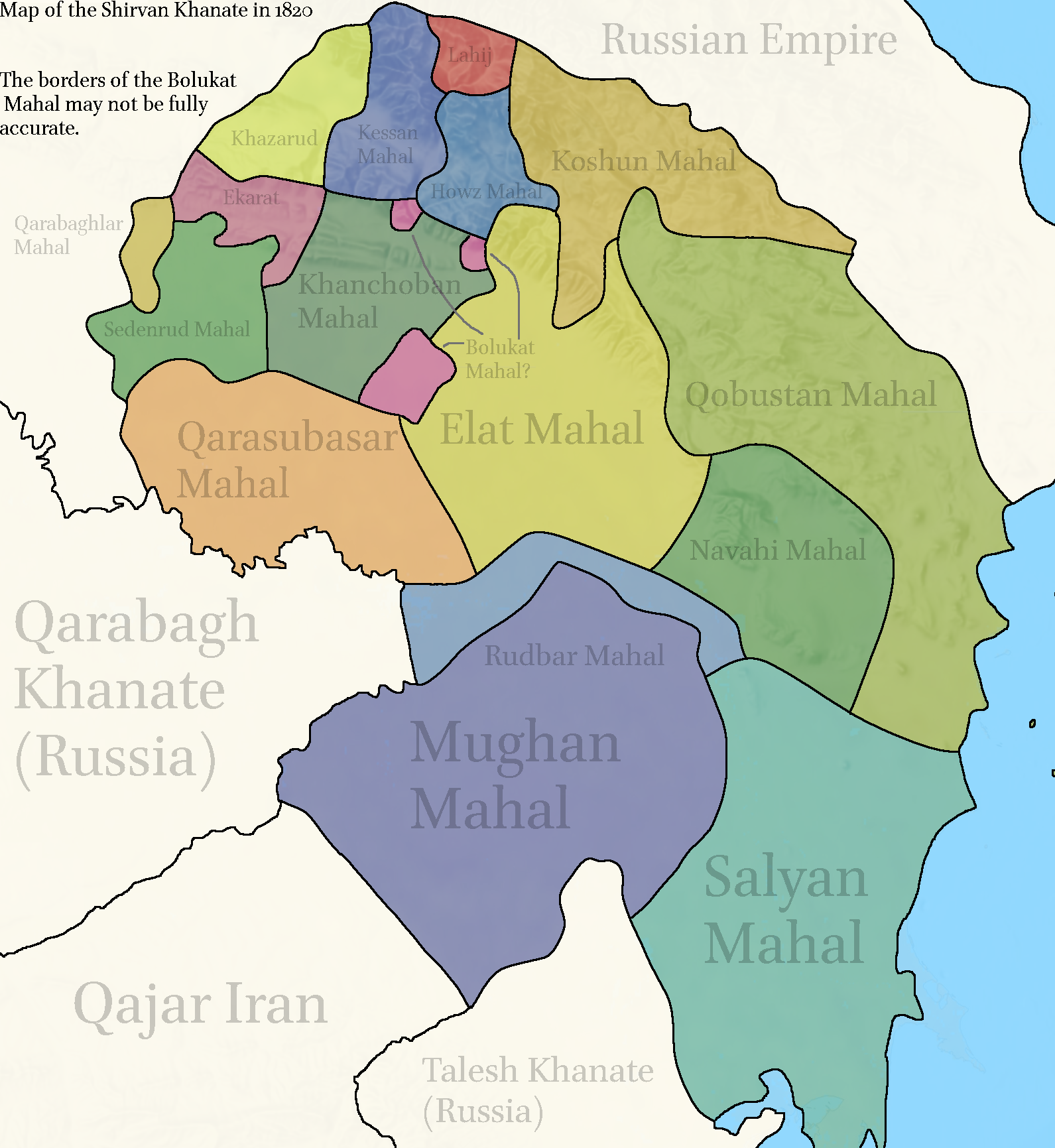|
Khanchobany
Khanchobany was a Turkic semi-nomadic tribe formed in the 17th century in Shirvan. Khanchobany means "Khan's shepherd". House of Sarkar was a noble clan from Khanchobany tribe. Tribe also gave his name to a folk dance Khanchobany. Khanchobany tribe were living primarily in Khanchobany mahal of Shirvan Khanate Shirvan Khanate ( fa, خانات شیروان, Khānāt-e Shirvan) was a Caucasian khanate under Iranian suzerainty, which controlled the Shirvan region from 1761 to 1820. Background Under the Safavid dynasty of Iran, Shirvan was a leading silk ..., because of being noble clan, mahal was not subject to any form taxation.Naila Bayramova,"The Shamakhy Khanate", Baku, 2009, "Tahsil" Press References Turkic peoples of Asia {{Asia-ethno-group-stub ... [...More Info...] [...Related Items...] OR: [Wikipedia] [Google] [Baidu] |
Khanchobany (dance)
Khanchobany ( az, Xançobanı) – is a Khanchobany dance, performed by men to fast music. It is also popular among Azerbaijanis of many regions. Origination In the 17th and 18th centuries, a tribe called the Khanchobany settled in the Shirvan region of modern day Azerbaijan Azerbaijan (, ; az, Azərbaycan ), officially the Republic of Azerbaijan, , also sometimes officially called the Azerbaijan Republic is a transcontinental country located at the boundary of Eastern Europe and Western Asia. It is a part of th .... The dance named for them is performed in a tribe spirit. The dance originated in the late 19th century. Performance The dance is performed both in weddings (mainly in village weddings) and during other holidays and concerts. It is performed only by men at a quick pace, with synchronized moves. External links Культура АзербайджанаВидеоролик исполнения Акифом Гурбетовым музыки танца Ханч� ... [...More Info...] [...Related Items...] OR: [Wikipedia] [Google] [Baidu] |
House Of Sarkar
House of Sarkar was ruling clan of Shirvan Khanate from Khanchobany tribe. "Sarkar" means "tax collector", which can give clues about profession of progenitor. Before reign First mention of dynasty dates back to 1721, during Haji Davud's uprising, as he deposed local ruler of Shamakhy who was a member of Sarkar clan. Upon creation of Shirvan Khanate by Nadir shah in 1734, Allahverdi beg Sarkar held possessions of several towns. Allahverdi beg died in 1767 and his sons Aghasi Khan and Muhammad Said khan Sarkar rose up against Hajji Muhammad Ali Khan and started diarchy in Shirvan Khanate. Another brother Agharazi beg Sarkar also mentioned as a ruler of khanate with ancient "Shirvanshah" title.Jahangir Zeynaloglu, "Land of Shirvanshah", 1931, Turkey Reign House of Sarkar ruled Shirvan until 1820. List of rulers: # Aghasi Khan & Muhammad Said khan Sarkar (together) (1763 - 1768 ) # Aghasi Khan (1778 - 1786) # Askar Khan (1786 - 1789) # Qasim Khan (1789 - 1796) # Mostaf ... [...More Info...] [...Related Items...] OR: [Wikipedia] [Google] [Baidu] |
Shirvan
Shirvan (from fa, شروان, translit=Shirvān; az, Şirvan; Tat: ''Şirvan''), also spelled as Sharvān, Shirwan, Shervan, Sherwan and Šervān, is a historical Iranian region in the eastern Caucasus, known by this name in both pre-Islamic Sasanian and Islamic times. Today, the region is an industrially and agriculturally developed part of the Azerbaijan Republic that stretches between the western shores of the Caspian Sea and the Kura River, centered on the Shirvan Plain. History Etymology Vladimir Minorsky believes that names such as Sharvān (Shirwān), Lāyzān and Baylaqān are Iranian names from the Iranian languages of the coast of the Caspian Sea. There are several explanations about this name: * Shirvan or Sharvan are changed forms of the word "Shahrbān" ( fa, شهربان, links=no) which means "the governor". The word "Shahrban" has been used since Achaemenian Dynasty as "Xshathrapawn" (satrap) to refer to different states of the kingdom. * Shervan in Per ... [...More Info...] [...Related Items...] OR: [Wikipedia] [Google] [Baidu] |
Pargana
Pargana ( bn, পরগনা, , hi, परगना, ur, پرگنہ) or parganah, also spelt pergunnah during the time of the Sultanate period, Mughal times and British Raj, is a former administrative unit of the Indian subcontinent and each ''Parganas'' may or may not subdivided into some ''pirs''. Those revinue units are used primarily, but not exclusively, by the Muslim kingdoms. After independence the Parganas became equivalent to Block/ Tahsil and Pirs became Grampanchayat. ''Parganas'' were introduced by the Delhi Sultanate. As a revenue unit, a pargana consists of several '' mouzas'', which are the smallest revenue units, consisting of one or more villages and the surrounding countryside. Under the reign of Sher Shah Suri, administration of parganas was strengthened by the addition of other officers, including a '' shiqdar'' (police chief), an ''amin'' or ''munsif'' (an arbitrator who assessed and collected revenue) and a ''karkun'' (record keeper). Mughal era In the ... [...More Info...] [...Related Items...] OR: [Wikipedia] [Google] [Baidu] |
Shirvan Khanate
Shirvan Khanate ( fa, خانات شیروان, Khānāt-e Shirvan) was a Caucasian khanate under Iranian suzerainty, which controlled the Shirvan region from 1761 to 1820. Background Under the Safavid dynasty of Iran, Shirvan was a leading silk manufacturer and its principal city, Shamakhi, became an important place for trade. In 1724, most of Shirvan was annexed to the Ottoman Empire by the Treaty of Constantinople. In 1734, the Iranian military leader Nader recovered Shirvan and installed Mohammad Mehdi Khan as its ''beglarbeg'' (governor-general). The following year, Mohammad Mehdi Khan was killed by rebellious dignitaries of the province. They had been incited by the governor of Darband, Morad-Ali Soltan Ostajlu. Mohammad Qasem Beg, who was a prominent dignitary of Shirvan and Nader's ''ishikaghasi-bashi'' (chamberlain), successfully appealed to Nader to pardon Shirvan. In 1735, Nader had the inhabitants of Shamakhi resettled in New Shamakhi ( Aqsu), situated 18 miles north ... [...More Info...] [...Related Items...] OR: [Wikipedia] [Google] [Baidu] |


